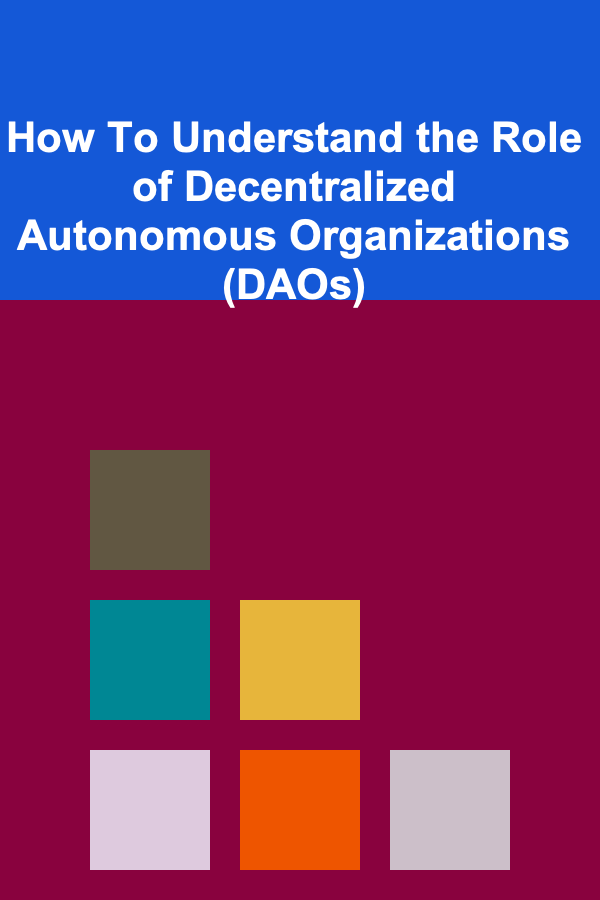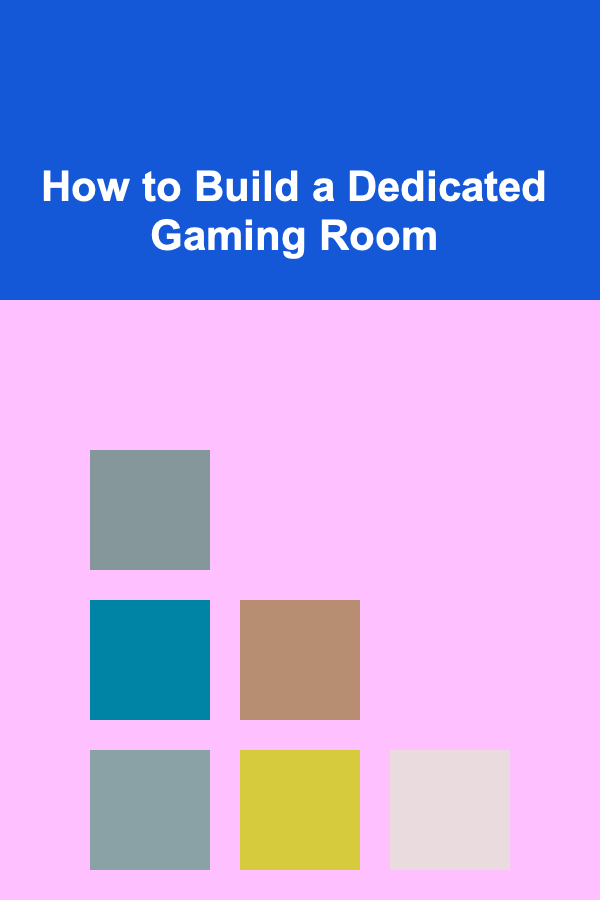
How To Understand the Role of Decentralized Autonomous Organizations (DAOs)
ebook include PDF & Audio bundle (Micro Guide)
$12.99$10.99
Limited Time Offer! Order within the next:

Decentralized Autonomous Organizations, commonly known as DAOs, represent a radical shift in the way organizations are structured and governed. Built on blockchain technology, DAOs aim to replace traditional hierarchical structures with decentralized, code-driven governance models. This evolution is part of the broader wave of innovation introduced by blockchain technology, which promises to revolutionize various sectors, from finance to governance. However, DAOs are not just a technological innovation---they also bring with them new challenges, opportunities, and philosophical questions about governance, decision-making, and the future of organizations.
In this article, we will explore the role of DAOs, how they function, the potential benefits and drawbacks they bring, and how they fit into the larger context of blockchain and decentralized technologies. By understanding these concepts, we can better appreciate how DAOs may shape the future of governance and organizational structures.
What Are DAOs?
A Decentralized Autonomous Organization (DAO) is an organization that operates through smart contracts on a blockchain, allowing it to function autonomously without the need for centralized authority or intermediaries. The primary characteristic of a DAO is that its governance, decision-making processes, and rules are encoded into software that is transparent and operates on a decentralized network. Unlike traditional organizations, which rely on a top-down hierarchy, DAOs are designed to function in a decentralized manner, with all stakeholders---typically token holders---participating in the decision-making process.
DAOs are typically structured around a set of rules known as "smart contracts." These are self-executing contracts with the terms of the agreement directly written into code. Once a DAO is deployed on a blockchain, its rules are set in place, and no single entity can alter or control the operations of the organization without the consent of the community. This structure ensures transparency, security, and autonomy, as decisions and actions are driven by consensus among stakeholders rather than a central authority.
Key Features of DAOs
1. Decentralization
The most defining characteristic of a DAO is its decentralization. Unlike traditional organizations, where decision-making power is concentrated in the hands of a few individuals (e.g., a CEO or board of directors), DAOs aim to distribute authority across all participants. This is usually achieved by issuing tokens that represent voting power. Token holders can propose changes, vote on proposals, and contribute to the organization's goals in a decentralized manner.
2. Autonomy
Once set up, DAOs operate autonomously according to predefined rules encoded in smart contracts. The code dictates how decisions are made, how funds are managed, and how the organization as a whole functions. This removes the need for intermediaries or administrators who would typically manage an organization's daily operations.
3. Transparency
Since DAOs are built on blockchain technology, every transaction and decision made within the organization is recorded on a public ledger. This ensures transparency, as anyone can inspect the data, track proposals, and verify votes and outcomes. Transparency is a critical feature that distinguishes DAOs from traditional organizations, where decision-making and financial transactions are often opaque.
4. Tokenized Governance
Governance within DAOs is typically tokenized. Individuals who hold tokens are given the ability to participate in decision-making processes. The more tokens a person holds, the more influence they have over the organization. This system allows for a broad distribution of power, though it also raises concerns about the concentration of power in the hands of a few large token holders.
How DAOs Operate
1. Smart Contracts and Code
At the heart of every DAO is a set of smart contracts---self-executing agreements written in code that automatically enforce the rules of the organization. These contracts define the governance framework of the DAO, including voting mechanisms, funding management, and the procedures for making changes or proposals. Once a DAO is created and deployed on the blockchain, the smart contracts cannot be altered without consensus from the community.
2. Proposals and Voting
In most DAOs, decisions are made through proposals that are put forward by members of the organization. These proposals can range from financial decisions, like funding projects, to governance decisions, such as changing the rules of the DAO. Once a proposal is submitted, token holders vote on it. The outcome of the vote determines whether the proposal will be implemented.
The voting system is typically weighted based on the number of tokens an individual holds, though variations exist. For example, some DAOs may employ quadratic voting, which reduces the influence of large token holders to prevent centralization of power.
3. Fund Management
One of the core functions of a DAO is to manage funds in a decentralized manner. This could involve managing investments, paying contributors, or funding community projects. In most DAOs, a treasury is established, and funds are disbursed based on the decisions of the community. The transparency of blockchain ensures that all financial transactions are publicly visible, reducing the potential for corruption or misuse of funds.
4. Autonomous Operations
The ultimate goal of a DAO is to operate autonomously. Once the initial setup is complete, the organization can run independently, with decisions being made through decentralized governance mechanisms. The automation provided by smart contracts ensures that all actions are executed as per the predefined rules, without requiring human intervention or oversight.
The Benefits of DAOs
1. Increased Transparency and Trust
DAOs provide a level of transparency that traditional organizations cannot match. Since all transactions, proposals, and votes are publicly recorded on the blockchain, members can trust that decisions are made fairly and according to the established rules. This transparency helps build trust among participants and reduces the risk of corruption or mismanagement.
2. Elimination of Intermediaries
In traditional organizations, intermediaries such as managers, executives, or legal entities are required to facilitate operations and decision-making. DAOs eliminate the need for these intermediaries, as governance is automated through smart contracts. This can reduce administrative costs and streamline decision-making.
3. Inclusive and Democratized Governance
DAOs offer a more inclusive governance model, as token holders---often anyone with an interest in the organization---can participate in decision-making processes. This democratizes power, giving everyone an equal voice, regardless of their position or financial status. As a result, DAOs can create more equitable organizations, where decisions are made based on collective input rather than the influence of a select few.
4. Efficiency and Speed
Smart contracts enable DAOs to operate more efficiently than traditional organizations. Transactions, decisions, and governance processes are automated, reducing the time it takes to implement changes or execute actions. This can make DAOs more responsive and agile, particularly in fast-moving industries or markets.
The Challenges and Limitations of DAOs
1. Security Risks
While blockchain technology is generally secure, DAOs are still vulnerable to bugs and vulnerabilities in their smart contracts. If a flaw exists in the code, it could be exploited by malicious actors, leading to loss of funds or other adverse outcomes. The infamous DAO hack of 2016, in which a vulnerability in the code was exploited to steal millions of dollars, is a prime example of the risks associated with DAO governance.
2. Governance Issues
While DAOs aim to decentralize governance, they still face challenges related to the concentration of power. In many DAOs, the influence of large token holders or whales can outweigh the voices of smaller participants. This raises concerns about whether DAOs truly deliver on their promise of decentralized and democratic governance.
Additionally, the voting process itself can be slow and cumbersome, especially in large organizations with many token holders. The decision-making process may become inefficient, and it can be difficult to reach consensus on contentious issues.
3. Legal and Regulatory Uncertainty
DAOs operate in a legal gray area, as many jurisdictions have not yet established clear regulations for decentralized organizations. This creates uncertainty for participants, particularly in areas such as taxation, intellectual property, and liability. Without a clear legal framework, DAOs may face challenges in gaining mainstream adoption or complying with existing laws.
4. Scalability
As DAOs grow in size, the decision-making process can become increasingly complex. In large DAOs with thousands or even millions of members, reaching consensus on proposals can take a long time, potentially slowing down the organization's operations. Scalability is a major concern for DAOs, as it requires efficient systems for governance and decision-making that can accommodate growing participation.
The Future of DAOs
Despite the challenges, DAOs are poised to play an important role in the future of governance and organizational structures. As blockchain technology evolves and more DAOs are created, we can expect improvements in governance mechanisms, security protocols, and legal frameworks. Some experts predict that DAOs will eventually disrupt traditional industries, such as finance, insurance, and even government, by offering more transparent, efficient, and equitable alternatives to existing systems.
DAOs also have the potential to create new forms of collaboration and innovation. By enabling decentralized decision-making, DAOs allow for more diverse input and collaboration from individuals around the world, bypassing geographic and institutional barriers. This could lead to the creation of more creative, flexible, and innovative solutions to global challenges.
Conclusion
Decentralized Autonomous Organizations (DAOs) represent a paradigm shift in how organizations are structured and governed. By leveraging blockchain technology and smart contracts, DAOs remove intermediaries, increase transparency, and democratize decision-making. While they offer numerous benefits, including enhanced trust and efficiency, DAOs also face significant challenges, including security risks, governance issues, and regulatory uncertainty.
As DAOs continue to evolve, their impact on traditional industries and governance systems will become more apparent. The future of DAOs is still uncertain, but they offer a promising glimpse into a more decentralized, autonomous, and inclusive world. As we move forward, the role of DAOs in reshaping governance and organizational structures will continue to be a key area of exploration for both technology and society.

How to Create a Checklist for Selecting Visual Aids and Supporting Materials
Read More
How to Create a Minimalist Plan for Your Next Move
Read More
How to Incorporate Art into Your Hobby Display
Read More
How to Manage Debt While Keeping Your Home Budget on Track
Read More
How to Tackle Workspace Distractions for Better Focus
Read More
How to Build a Dedicated Gaming Room
Read MoreOther Products

How to Create a Checklist for Selecting Visual Aids and Supporting Materials
Read More
How to Create a Minimalist Plan for Your Next Move
Read More
How to Incorporate Art into Your Hobby Display
Read More
How to Manage Debt While Keeping Your Home Budget on Track
Read More
How to Tackle Workspace Distractions for Better Focus
Read More